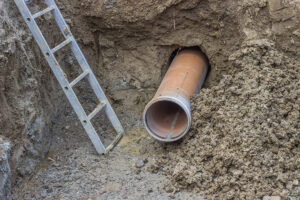
Knowing the signs of a sewer line issue can ensure that you are able to notice problems early on and get the repairs needed before it becomes an emergency.
Sewer lines may not be a glamorous topic of conversation, but they play a crucial role in maintaining the hygiene and functionality of our homes. A sewer line issue can quickly turn into a messy and expensive problem if left unattended. Recognizing the signs of trouble early can save you from the headache of a major repair or replacement.
Slow-Draining Fixtures
One of the most common signs of a sewer line issue is slow-draining fixtures. If you notice that water is draining more slowly than usual in multiple sinks, bathtubs, or toilets in your home, it could indicate a blockage or damage in the sewer line. This slowdown occurs because the water has trouble moving through the clogged or damaged pipe.
Foul Odors
A foul, sewage-like odor is a clear indicator that something is amiss with your sewer line. These odors may come from the drains, particularly when you use water fixtures. If you detect a persistent, unpleasant smell in your home or yard, it’s time to investigate further.
Gurgling Noises
Gurgling noises from your plumbing system can be unsettling. If you hear gurgling sounds when you flush the toilet or run water down the sink, it suggests that air is trapped in the sewer line due to a blockage. The gurgling noise is the air trying to escape, and it’s a sign of potential issues.
Backed-Up Drains
A more severe sign of a sewer line issue is backed-up drains. If multiple drains in your home are overflowing or backing up, this is a clear indication that there is a significant problem with your sewer line. It’s essential to address this issue promptly to prevent further damage and contamination.
Soggy Lawn or Puddles
Excess moisture in your yard, particularly in areas near sewer line pipes, can indicate a leak or rupture. Sewage leaking into the ground can create soggy lawns, puddles, or even sinkholes. Not only does this damage your property, but it can also pose health risks.
Sewage Backup
The most alarming sign of a sewer line issue is a sewage backup in your home. This means that sewage is flowing back into your sinks, tubs, or toilets. A sewage backup is not only disgusting but also hazardous to your health. It requires immediate attention from a professional plumber.
Greener Grass or Unusual Plant Growth
Surprisingly, an unusually lush and green patch of grass in your yard could be a sign of a sewer line problem. Sewage acts as a fertilizer, and when it leaks into the soil, it can promote the growth of grass and plants. If you notice an area of your lawn that’s inexplicably greener than the rest, it’s time to investigate.
Pest Problems
Pest infestations, such as rats and insects, can also indicate a sewer line issue. Sewage leaks provide a breeding ground and a food source for these unwanted guests. If you notice an increase in pest activity in or around your home, it’s worth checking for sewer line problems.
Why Address Sewer Line Issues Promptly
Ignoring the signs of a sewer line issue can lead to serious consequences. Here are some compelling reasons to tackle the problem as soon as you notice the warning signals:
- Health Risks: Sewage contains harmful bacteria and pathogens that can cause illness if not properly contained. A backup or leak can expose you and your family to these health risks.
- Property Damage: Untreated sewer line issues can cause significant property damage, from water damage to structural issues. Repairing these damages can be costly and disruptive.
- Environmental Impact: Sewage leaks can harm the environment, contaminating soil and water sources. Being environmentally responsible means addressing these issues promptly.
- Peace of Mind: Dealing with a sewer line problem promptly saves you from the stress and inconvenience of sudden, unexpected repairs.
- Cost-Effective: Early intervention is usually less expensive than waiting until the problem becomes a major crisis. Timely maintenance and repairs can save you money in the long run.
What to Do When You Suspect a Sewer Line Issue
If you’ve observed any of the signs mentioned, it’s crucial to take action promptly:
- Contact a Professional: A licensed plumber or sewer specialist can assess the situation and determine the extent of the problem. They will use specialized tools, like video cameras, to inspect the sewer line and identify the issue.
- Repairs or Replacement: Depending on the severity of the problem, your plumber will recommend either repairs or a full sewer line replacement. Repairs are often possible for minor blockages, while significant damage may require a replacement.
- Routine Maintenance: Regular sewer line inspections and preventive maintenance can help prevent future issues. Consult with a professional to establish a maintenance schedule.
Call Mahon Plumbing Today
If you still have more questions regarding your plumbing, we here at Mahon Plumbing are here to help. We have been serving the wider Baltimore area since 1994, so we have 25 years of experience to back up our fantastic service! Call us at our Baltimore location at 410-766-8566 or our Pasadena location at 410-636-7944. Be sure to keep up with us on social media by following us on Facebook or Twitter.
